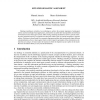AOIS
2003
14 years 1 months ago
2003
Numerous methodologies for developing agent-based systems have been proposed in the literature. However, their application is still limited due to their lack of maturity. Evaluati...
IADIS
2004
14 years 1 months ago
2004
This paper introduces a study about managing the performance of virtual teams using intelligent agents. Through a review of previous research, the paper starts by contextually sit...
EUMAS
2006
14 years 1 months ago
2006
Ontology matching is currently a key technology to achieve the semantic alignment of ontological entities used by knowledge-based applications, and therefore to enable their inter...
EUMAS
2006
14 years 1 months ago
2006
One of the major puzzles in performing multi-agent-based simulations is the validity of their results. Optimisation of simulation parameters can lead to results that can be deceit...
EUMAS
2006
14 years 1 months ago
2006
Forming effective coalitions is a major research challenge in the field of multi-agent systems. Central to this endeavour is the problem of determining the best set of agents that...
EUMAS
2006
14 years 1 months ago
2006
This article presents a multi-agent method to tackle multidisciplinary optimisation, based on the notions of cooperation and self-regulation. It is focused on the preliminary airc...
EUMAS
2006
14 years 1 months ago
2006
OGY
EUMAS
2006
14 years 1 months ago
2006
In a normative society there are two main problems: defining norms and enforcing them. Enforcement becomes a complex issue as societies become more decentralized and open. We propo...
EUMAS
2006
14 years 1 months ago
2006
This paper explores a general model of economic exchange between heterogeneous agents representing firms, traders, or other socioeconomic entities, that self-organise into coaliti...
EUMAS
2006
14 years 1 months ago
2006
Norms constitute a powerful coordination mechanism among heterogeneous agents. We propose means to specify and explicitly manage the normative positions of agents (permissions, pro...

